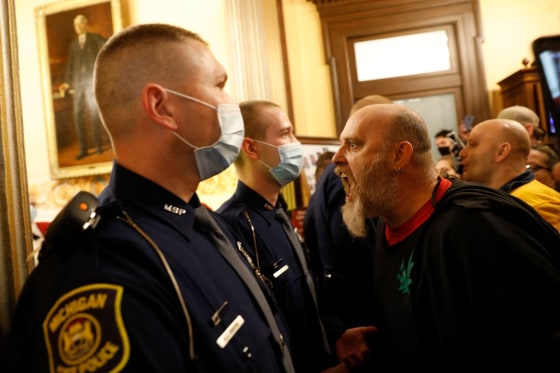It was an unsettling scene in Lansing late last week, when hundreds of protestors went to Michigan's capitol building -- many of them brandishing firearms, including military-style rifles -- to condemn efforts to prevent the spread of the coronavirus. Fortunately, there was no violence, but the confrontations and apparent attempts to intimidate elected officials were frightening.
Reflecting on these kinds of displays, Dr. Deborah Birx, the White House coronavirus response coordinator, told Fox News yesterday that the protests are "devastatingly worrisome" to her personally. Highlighting the public-health risks the activists have taken, Birx added, "[W]e need to protect each other at the same time we're voicing our discontent."
Perhaps the White House coronavirus response coordinator should have a chat with her boss, because Donald Trump doesn't appear to share her concerns.
President Trump expressed support Friday for armed protesters who had stormed the Michigan Capitol, demanding the state lift coronavirus restrictions.... Trump tweeted Friday that "these are very good people, but they are angry. They want their lives back again, safely!"
It was not the only example of the president voicing public support for those protesting against life-saving mitigation efforts. It was, after all, a couple of weeks ago when the Republican started publishing missives calling for states with Democratic governors to be "liberated," which had the effect of egging on far-right activists.
During his latest Fox News event last night, Trump added, "All those people out there that are protesting, they're right."
To put it mildly, it's curious to see the incumbent president express public support for protestors, especially given the ugly images many Americans have seen from their recent events. Indeed, the New York Times published a report over the weekend noting, "Although the protests that have broken out across the country have drawn out a wide variety of people pressing to lift stay-at-home orders, the presence of extremists cannot be missed, with their anti-immigrant and anti-Semitic signs and coded messages aimed at inspiring the faithful, say those who track such movements."
And yet, there's Donald Trump, expressing his confidence that protestors aren't just "right," but also "very good people." The comments came nearly three years after the president defended some racist protestors in Charlottesville as "very fine people."
Trump's magnanimity is far more limited toward American protestors he doesn't like. Immediately following his inauguration, for example, the new president denounced his detractors who took to the streets as "professional anarchists, thugs and paid protesters." When Brett Kavanaugh's Supreme Court nomination sparked activism, Trump repeatedly dismissed the jurist's critics as "paid protestors."
And when athletes took a knee to protest racial injustices, the president suggested it could be seen as a deportable offense. He argued in 2018, in reference to the athletes, "Maybe you shouldn't be in the country."
But when a group of angry folks show up at a state capitol with semiautomatics, condemning life-saving measures during a pandemic, Trump declares with confidence that they're "great people."
